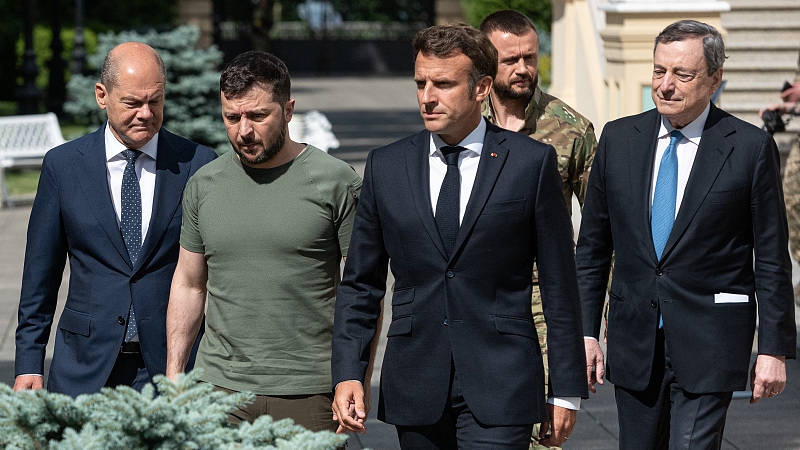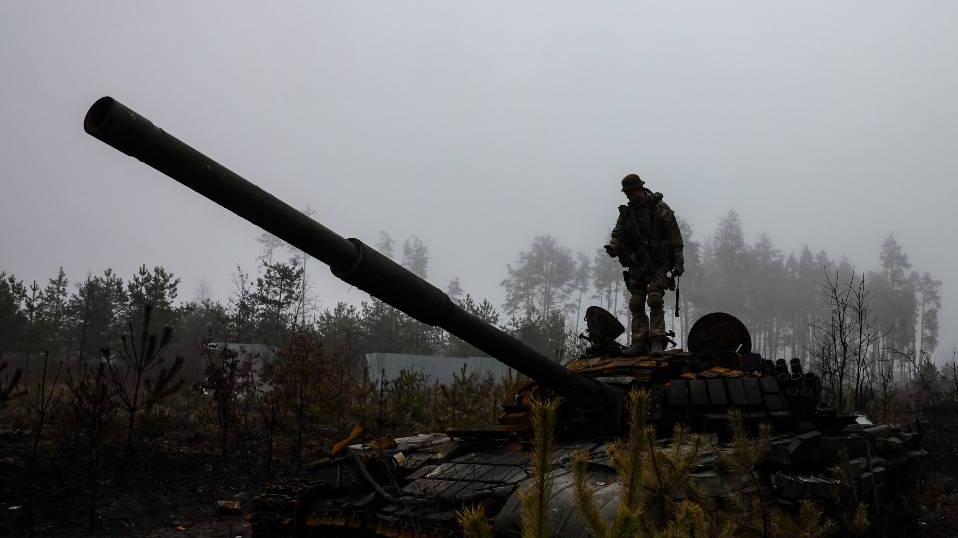
Ukrainian President Volodymyr Zelenskyy (2nd L), French President Emmanuel Macron (2nd R), German Chancellor Olaf Scholz (L) and Italian Prime Minister Mario Draghi (R) walk to the press conference area in Kyiv, Ukraine, June 16, 2022. /CFP
Ukrainian President Volodymyr Zelenskyy (2nd L), French President Emmanuel Macron (2nd R), German Chancellor Olaf Scholz (L) and Italian Prime Minister Mario Draghi (R) walk to the press conference area in Kyiv, Ukraine, June 16, 2022. /CFP
Editor's note: Bobby Naderi is a London-based journalist, guest contributor in print, radio and television, and documentary filmmaker. The article reflects the author's opinions, and not necessarily the views of CGTN.
To put the Ukraine crisis in the largest and most devastating context possible, Western sanctions against Russia have caused tremendous destruction for everyone involved. They have failed to advance U.S. interests, let alone improve security conditions in Europe. It's a reminder that the extensive economic coercion is doing more harm than good, worsening many of the geopolitical problems and misunderstandings it is supposed to resolve.
As an example of where we are headed in this Ukraine-Russia war moment, the policy is proving a disaster for everyone, threatening a seemingly never-ending energy crisis and food insecurity across the planet. Barely noticed but more disastrous, continuing to fight will bring more death and destruction to the people in Ukraine. With all this in mind, there can be no military solution to the Ukraine crisis when fundamentals are in no one's favor.
According to the United Nations, the conflict is preventing grain from leaving the "breadbasket of the world" and making food more expensive, threatening to worsen shortages, hunger and political instability in developing countries. The conflict has also reduced reliance on international dispute resolution mechanisms provided by the UN in lieu of resorting to military force.
Together, Russia and Ukraine export nearly a third of the world's wheat and barley, and more than 70 percent of its sunflower oil. Russia is the top global fertilizer producer. World food prices were already soaring and the war made things worse, preventing Ukrainian grain from getting to many countries in the Middle East, North Africa, and Asia.
The world must act now to end this man-made calamity and to save millions of people from the brink of starvation. If the hostilities continue, then the enormity of the task to try and keep people alive will be mind-boggling. The Ukraine crisis is now on the right side of the line in terms of whether it can be resolved. But it won't stay there if the people of good conscience don't address this quickly.
The U.S. and its NATO allies supply arms to Ukraine, which has to stop, too. The international community wants the fighting to end. In private, some Western European diplomats have made clear that they no longer expect a military resolution, and hope that a political agreement can give them a way out. Others, however, still claim that the strategic benefits justify the costs. Placing their geopolitical rivalries above all other critical concerns, they claim that Moscow is eager to create new frontlines in Europe, and only robust military action has limited its expansionist project.
Under scrutiny, nonetheless, these politically-motivated claims and justifications don't hold up. In almost every case, the war and geopolitics have made the NATO-Russia problems worse while creating new ones. Western talking points on this part of the conflict have failed to convince most Ukraine observers. The prolongation of the conflict and the resultant instability have provided all warring sides with a conducive environment to sustain themselves and regenerate that external capacity.
In the prevailing environment, the world community, through the United Nations, is under obligation to act with more teeth against the war. This includes tough direct questions that the Pentagon can answer about the impact of American weapons supplies, and the nature and impact of targeting the Russian people economically.

A Ukranian soldier takes pictures of a Russian tank in the outskirts of Kyiv, Ukraine, April 1, 2022. /AFP
A Ukranian soldier takes pictures of a Russian tank in the outskirts of Kyiv, Ukraine, April 1, 2022. /AFP
No doubt the problem of weapons supplies and maximalist sanctions transcends the Ukraine war and has contaminated a growing swathe of Western policy. This policy continues to be a major driver of the conflict and will complicate any future peace talks.
It is not striking that maximalist sanctions and all-too-militarized competition – sold as a low-cost alternative to military conflict – have failed to achieve any stated policy goals. It should not come as a surprise that the West's economic warfare has backfired and encouraged more of the same behavior from the Kremlin.
The signs are everywhere that rather than dissuading the Kremlin as intended, the West's long list of premeditated sanctions have exacerbated inflation and worsened food insecurity in many countries. Confronting a predictable and predicted result, they are now experiencing energy insecurity and economic blowback on multiple fronts. It's an ugly prospect and regrettably is unlikely to change in time to avoid other nightmarish outcomes.
This is not idle musing. The crisis in Ukraine is the last thing the world needs right now. Now is the time to reflect on the case for people of good will – particularly environmental policymakers – to require significant cooperation among the major powers to stop watching the war rage. The benefits of doing so are beyond dispute.
Turning the attention from war-making to ending the war will prevent further death and habitat and farmland destruction, allow some 13 million refugees to return to their homes, reduce food insecurity and soaring fuel prices, and improve security conditions in Europe. Such international cooperation to overturn an elite consensus on the importance of geopolitical competition will also enable global trade and planetary connectedness to return to normal levels, potentially for decades to come.
(If you want to contribute and have specific expertise, please contact us at opinions@cgtn.com. Follow @thouse_opinions on Twitter to discover the latest commentaries in the CGTN Opinion Section.)

